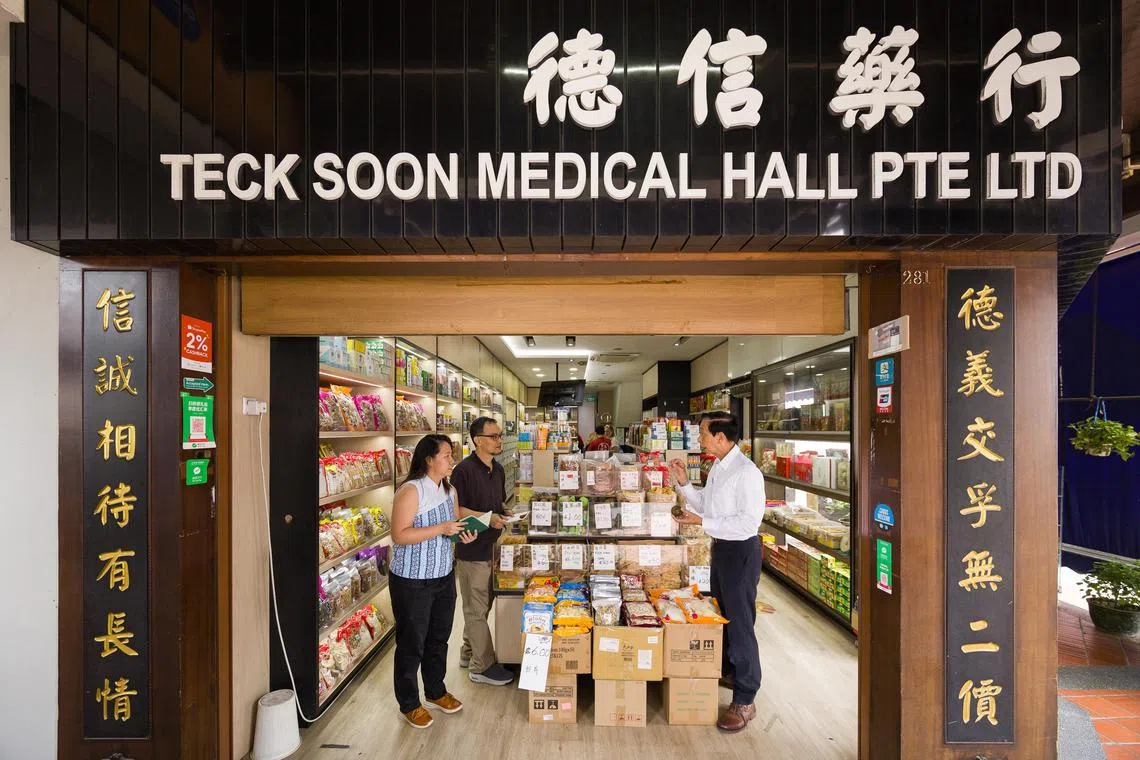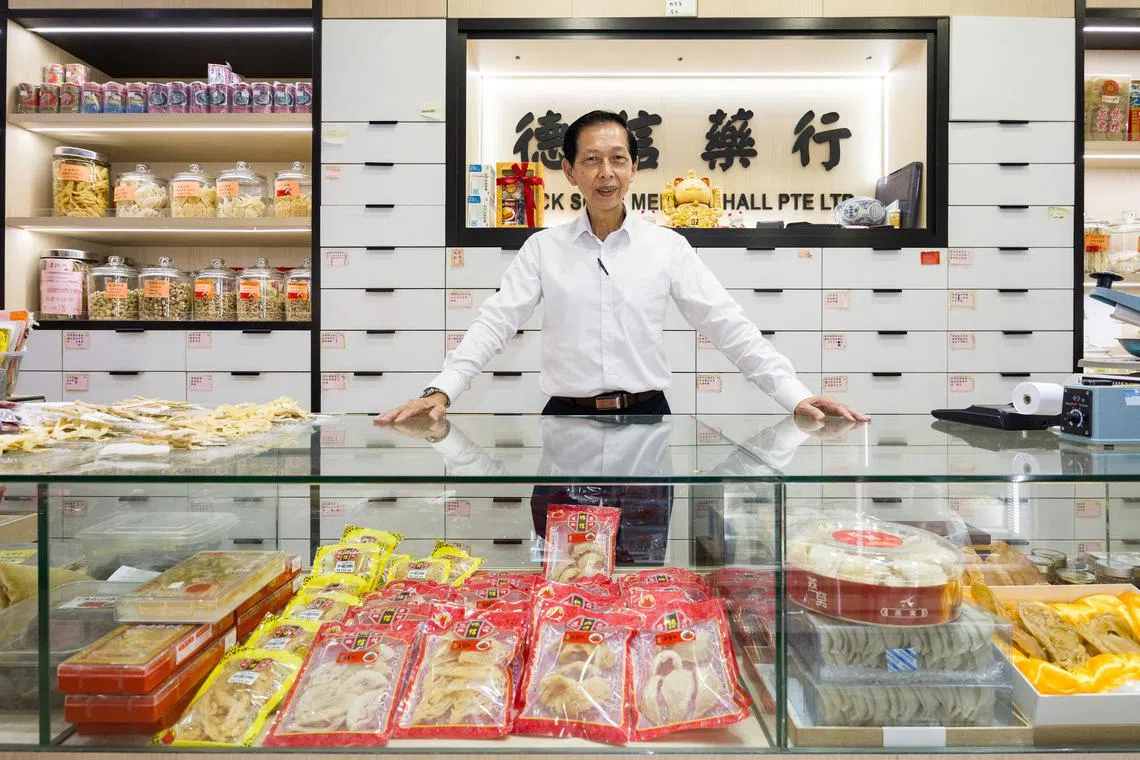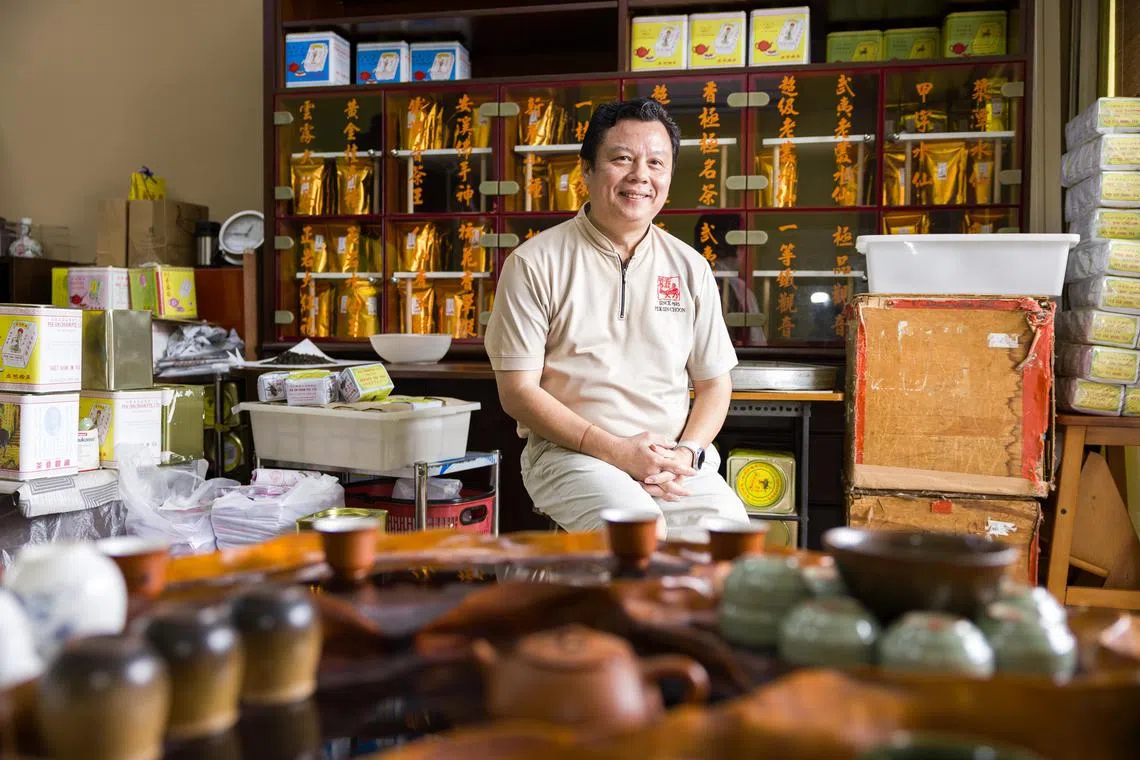Innovation amid tradition: How Chinatown merchants move with the times
Sign up now: Get ST's newsletters delivered to your inbox

Teck Soon Medical Hall is among at least 20 old shops in Chinatown that are part of a study to trace the histories of the shops.
ST PHOTO: BRIAN TEO
SINGAPORE – A small sales innovation did big wonders for a traditional Chinese medicine (TCM) business.
Teck Soon Medical Hall decided in 1982 to display its Chinese medicinal herbs at its storefront, instead of keeping them in drawers at the back of the shop, as was the practice in years past.
“Sales shot up by 30 per cent because our customers could see the quality of the herbs,” said Mr Chow Khai Shui, a 64-year-old TCM practitioner who runs the shop in South Bridge Road and three branches in Chinatown.
“Of course, many others in the trade soon followed the same practice.”
According to Mr Chow, a second-generation owner, his business also pioneered pre-packed packages of herbs for different needs and ailments.
Teck Soon Medical Hall is among at least 20 old shops in Chinatown that are part of a two-year study by a group of five researchers to trace the histories of the shops.
Titled Small Businesses And Shops Of Chinatown, 1819-1980s, the project examines how the businesses coped between the 1960s and 1990s when Chinatown changed dramatically due to urban renewal, amid the development of shopping centres and public housing estates.
It has been awarded a heritage research grant by the National Heritage Board. The team, led by Dr Seng Guo Quan from the National University of Singapore’s history department, also plan to write a book at the end of the study.
While they are at the halfway mark of the project, one common theme has already stood out.
“It’s innovation – learning and adapting to new trends and making use of opportunities,” said Dr Loh Kah Seng, a historian involved in the project.
The 52-year-old director of research consultancy Chronicles Research and Education added: “We wish to find out how shopkeepers found new opportunities, niches and strategies to sustain and develop their businesses. This will allow us to acknowledge their contributions to the remaking and conservation of Chinatown.”
Ms Lynn Wong, 35, director of heritage consultancy Bridging Generations and another researcher on the project, said: “Unlike the usual view of traditional shops being old-school and backward, they are the forerunners in their industry, introducing concepts that have become the norm today and working closely with the community to meet new needs.”
Six years after Teck Soon Medical Hall was founded by Mr Chow’s father, Mr Chow Chee Yik, in Sago Street in 1963, the place was earmarked for clearance as part of urban redevelopment. It relocated to different areas in Chinatown before coming to its current premises in 2000.

Mr Chow Khai Shui, a traditional Chinese medicine practitioner, runs a Teck Soon Medical Hall in South Bridge Road and three other branches in Chinatown.
ST PHOTO: BRIAN TEO
The various relocations did not affect its business, thanks to its innovations, commitment to quality, and pool of regular customers, said the younger Mr Chow.
In 2019, it started its online shop, which helped increase business by 10 per cent, he added.
Besides modernising its packaging, it plans to post healthcare videos on social media to attract younger customers.
“Many of the younger ones like to stay up late, which is bad for health,” said Mr Chow. “We will promote herb packages that will help them overcome the resulting side effects.”
Pek Sin Choon, a 99-year-old Chinese tea business in Mosque Street, has created new tea blends almost yearly since 1998, while retaining the tradition of packing its tea leaves by hand.
For example, it specially curated the Qixi tea for the Qixi Festival
To date, it has introduced 14 types of Nanyang tea.
Mr Kenry Peh, 55, the fourth-generation owner of the business, said: “Our teas are still in good demand since the 1930s, and we provide our teas to 70 (per cent) to 80 per cent of bak kut teh eateries in Singapore.”

Mr Kenry Peh is the fourth generation of his family to run Chinese tea business Pek Sin Choon.
ST PHOTO: BRIAN TEO
To promote tea heritage, it organised the Nanyang Tea Challenge for five years from 2018 to encourage participants to taste, brew and blend their own tea.
The business has also been reaching out to younger customers via its website and social media platforms since 2014 – during the Covid-19 pandemic, the website saw five to six times more sales.
Chinatown will continue to evolve.
The Singapore Land Authority, Singapore Tourism Board and Urban Redevelopment Authority jointly launched a collective tender
“While redevelopment is good, Chinatown’s heritage and cultural values must be preserved,” said Mr Chow. “It cannot come from a purely commercial perspective.”
Today, tourists are attracted by the many shops selling Singapore souvenirs, while “locals have nothing much to see”, he said, adding that even the Chinatown Food Street shuttered
“Care must be taken to bring in the right tenants with unique features to revive the old charm of Chinatown, so that it can regain its past glory,” he said. “As for me, I will do what I can to preserve tradition and attract more young people.”
Chinatown businesses that wish to be part of the study can e-mail lohkahseng@chroniclesresearch.com


